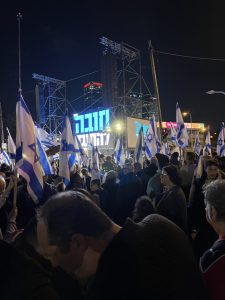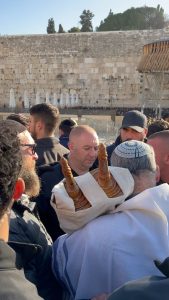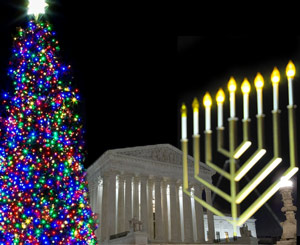Six13 brings us a welcome to this Shabbat with the Prince of Egypt medley.
Enjoy the music and the story in the lyrics. Count the Omer with us as we travel towards Sinai.
Shabbat Shalom
Six13 brings us a welcome to this Shabbat with the Prince of Egypt medley.
Enjoy the music and the story in the lyrics. Count the Omer with us as we travel towards Sinai.
Shabbat Shalom
As we rise toward Shabbat, this song I found on Ulpan La-Inyan by Shai Gabso, I lift My head- Arim Roshi, offers us a chance to reflect at the end of another tumultuous week.
Shabbat Shalom
We Rise!
Sung by Batya Levine and members of Hadar, we welcome Shabbat in song. As we pray for the Peace of Jerusalem, we know there is much work to be done.
Let us Rise together-
Shabbat Shalom
Profoundly important words capture what so many of us felt on our recent trip to Israel.
Thank you, rabbi, for sharing this complexity with such clarity.
In these particularly turbulent times, this pensive song from the incomparable Rabbi Debra Sacks Mintz is a soulful prayer to help us enter Shabbat.
May peace and wholeness come to all.
Shabbat Shalom
Feeling Conspicuous
 Wandering the streets of old Zurich, I felt conspicuous. As usual, I wore my Ukrainian Sunflower Kippah, which usually draws attention. But somehow, this time felt different. The medieval alleys and streets were charming; gassen and the strassen wound around, up and down hilly terrain. The cobblestones beneath our feet, the old-style buildings, and the lake uniquely charm Zurich. And I was generally comfortable in my surroundings. But I wondered if people were looking at the Kippah or the Jew.
Wandering the streets of old Zurich, I felt conspicuous. As usual, I wore my Ukrainian Sunflower Kippah, which usually draws attention. But somehow, this time felt different. The medieval alleys and streets were charming; gassen and the strassen wound around, up and down hilly terrain. The cobblestones beneath our feet, the old-style buildings, and the lake uniquely charm Zurich. And I was generally comfortable in my surroundings. But I wondered if people were looking at the Kippah or the Jew.
Switzerland was neutral during the war, of course. They tend to be neutral on most things except for commerce, where they have a very pro-business attitude. Zurich was not a city that experienced Nazi occupation or Jewish deportations. But the streets seemed strangely empty of Jews.
In a meeting with the liberal Rabbi of Zurich, he shared that it is a small Jewish community that gets along well. The more orthodox denominations do not mix with the more liberal ones, and several synagogues exist. Knowing this did not assuage my feelings as we wandered around a portion of the city where I was the identifiable Jew. The rabbi wore the only other kippah I saw.
I have walked the streets of many cities in many countries, clearly identifying myself by my kippah, so I am unsure why this experience seemed heightened. Perhaps the challenges in Israel, wherein orthodox political parties have pushed to define who is a Jew, have created a particular kind of angst.
In the United States, my kippah is a conversation starter. People often comment on my kippah, on the streets, or even at the orchestra. I use this kippah hoping to discuss supporting Ukraine war victims. I only received furtive glances here, except for the man at passport control. As I was leaving, he cheerfully commented on the kippah’s unique nature, giving me the opportunity to talk about Ukraine.
There is a saying that just because I am paranoid doesn’t make me wrong. But for now, I will chalk it up to my paranoia and continue to publicly and proudly identify who I am.
Love (with)… all your perfect imperfections
John Legend’s beautiful song All of me, inspired by his love for his wife, Chrissy, moved and inspired many of us with the romance. But what happens when reality falls so far short of the romantic vision, pushing the boundaries of acceptable, even tolerable? Unfortunately, divorce is often the result.
I am struggling with my relationship with Israel. The aspirations of our ancient homeland land and our history drew me to the miracle that was and, in many ways, continues to be this place. But the state is pressing on issues such as racism, tolerance for pluralism, and checks and balances in government. I was suckled in a mythic Israel but have learned to ween myself, given the practicalities of a nation-state that cannot live solely by the hopes and dreams of the Jewish people. However, as Ben Gurion understood, to be a nation like other nations. It was a pragmatic understanding of survival in the harsh real world. Today, the ideals of a homeland that is both Jewish and a democracy are threatened by raw political power and expediency.
We had come to accept Jewish and Democracy in tension. But, for the first time, we face the existential crisis of threatening both. The fractious rough and tumble nature of Israeli politics and the need to form a governing coalition in Knesset has brought us to a new place.
Over time, we developed complacency in our attitudes. Israel, as a Jewish Democratic state, was always considered a given. Laws and policies often were merely annoyances and opportunities for workarounds. “Religious” marriage meant a weekend in Cyprus. The orthodox church that has become the Kotel was not an issue for the secular. Israelis have enjoyed unprecedented prosperity and unrivaled military strength, making this a safe and secure place for most. Palestinian rights, west bank settlements, and civil rights were not on the radar screen of most and were relegated to the margins.
Then came Bibi 3.0. The assault on cherished rights, once considered unassailable, has awoken many from slumber. The protests in the streets by hundreds of thousands are sending a strong message that this is unacceptable. “Guns and butter” at any cost are not enough. The extensive unbridled settlement program is intolerable, and the Israeli terrorist response to terrorism is rightly called a pogrom. To use a familiar Jewish word, it is a Shanda.
 I struggle to love the country as I continue to love the land that held a people charged to be a light unto the nations. This is my heritage. Last week during my trip to Israel with the CCAR, I was proud to be at two demonstrations in Jerusalem and Tel Aviv. I was deeply moved to see the sea of Israeli flags and patriotism on display. However, I was disgusted and deeply aggrieved to be spat on when attempting to bring our Torah for Rosh Chodesh and assaulted by yeshiva bochers as trying to stop my expression of Judaism in the Kotel space.
I struggle to love the country as I continue to love the land that held a people charged to be a light unto the nations. This is my heritage. Last week during my trip to Israel with the CCAR, I was proud to be at two demonstrations in Jerusalem and Tel Aviv. I was deeply moved to see the sea of Israeli flags and patriotism on display. However, I was disgusted and deeply aggrieved to be spat on when attempting to bring our Torah for Rosh Chodesh and assaulted by yeshiva bochers as trying to stop my expression of Judaism in the Kotel space.
I cannot turn my back on this precocious and precarious experiment. But I am distraught. I support those who do the work, including the Israeli Religious Action Center and the brave Women of the Wall. I also proudly support NGOs who envision a place where people can live in a shared society, including the Yad b’Yad schools and the New Israel Fund, on whose regional board I serve. I am actively considering dual citizenship, not to lessen my devotion to the United States, but to achieve a voice in shaping the destiny of Israel as only a voting citizen can do. I urge everyone to evaluate where they stand and what they want to do at this critical juncture.
No one can sit on the sidelines any longer.
We use Shir Hashirim as part of the imagery in welcoming Shabbat.
12 Tribes Music shares this love song.
Shabbat Shalom
Maoz Tzur shared by cantors from Canada.
Chag Chanukah Sameach and
Shabbat Shalom!
Fess up– Hanukkah is the Jewish Christmas!
Before I continue, I will let those of you gasping for air catch your breath.
Yes, indeed, the rabbi went there! But it is hard to refute the statement. And you know what else? It is okay.
Here in the United States, we have thought longingly of the Christmas portrayed ironically by Irving Berlin- replete with a white (from the snow, that is) Christmas with cards, sleigh bells, and glistening trees. The Coca-Cola Santa Claus brings presents to everyone traveling on a flying sleigh powered by eight reindeer (nine including Rudolph), Christmas Trees, gifts, love, and good cheer. Of course, once the marketers got hold of this, they commercialized the holiday even further. Everyone who ever sang anything now records an album of Christmas songs or has a television Christmas special.
Christmas with cards, sleigh bells, and glistening trees. The Coca-Cola Santa Claus brings presents to everyone traveling on a flying sleigh powered by eight reindeer (nine including Rudolph), Christmas Trees, gifts, love, and good cheer. Of course, once the marketers got hold of this, they commercialized the holiday even further. Everyone who ever sang anything now records an album of Christmas songs or has a television Christmas special.
Who wouldn’t want to be a part of this party?
So we have amped up Hanukkah, a minor yet complicated holiday, not even part of the Jewish Bible. Our Acceptance in this country is the great miracle of our time. And if we could place the menorah in the window without fear of retribution, what else might we enjoy? The secularized Christmas is at the center of the American holiday season, bounded by Thanksgiving and New Year’s.
So we are in full bloom- we have Hanukkah bushes, lights of blue and white to decorate the house, and latkes and sufganiyot are now things in the American public space! Giant menorahs are lit alongside the Christmas trees, eclipsing the simple manger scenes of the holiday’s religious roots. It is a mash-up of the best our traditions have to offer, and we all join together in the kind of unity we could only pray might somehow extend to all the other days of the year (either 364 if you are Christian or 357 if you are Jewish).
scenes of the holiday’s religious roots. It is a mash-up of the best our traditions have to offer, and we all join together in the kind of unity we could only pray might somehow extend to all the other days of the year (either 364 if you are Christian or 357 if you are Jewish).
They say competition is a good thing. And arguably, Hanukkah is a bigger, better celebration because of Christmas.
Let us wish everyone Happy Holidays and a year of bounty and joy. Let us thank God for bringing us to a time when our lights can burn brightly, and we can be with our brothers and sisters; whatever their faith traditions, we are together here in the United States.